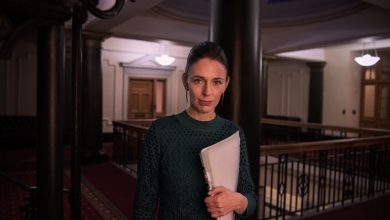11 Families Had Just Welcomed Newborns. A Hospital Fire Left Them Devastated.

TIVAOUANE, Senegal — The baby boy did not yet have a name.
He was only a day old on Wednesday when a fire broke out in the neonatal section of the hospital where he was born, in the holy city of Tivaouane in central Senegal. He was on the maternity ward’s third floor; his mother, still recovering from a caesarian, was on the first and had not seen him since.
Eleven newborn babies died in the fire, devastating their families and shocking the West African nation, which has faced a series of deadly incidents in maternity wards in recent years.
Relatives of the newborn boy had flocked to the hospital to celebrate his arrival. When the fire started at about 9 p.m. on Wednesday, his aunt, Mame Anta Gueye, had been praying in the hospital compound.
“We were here,” Ms. Gueye said on Thursday, sitting with relatives near the ward where her nephew had died, and where her sister was mourning. “And we couldn’t do anything.”
The fire at the Mame Abdou Aziz Sy Dabakh Hospital of Tivaouane was caused by a short circuit, according to the city’s mayor, Demba Diop. But on Thursday, there were few details of how the fire had spread, and whether any adults — hospital workers or parents — had been in the room with the newborns.
Three babies were saved, Mr. Diop said on local radio.
Grieving families waited for news on Thursday afternoon under the shade of neem trees outside the hospital, desperate for more details about what had happened, and why, and when they could retrieve the bodies of their loved ones.
Inside the grounds of the hospital, the troubled state of Senegal’s health care system was on display, with discarded stretchers and broken hospital beds strewn about, as well as syringes, bedside monitors and microscopes.
A streak of black soot marked the area where the babies had been sleeping, rising from a top-floor window of the turquoise-and-white painted building to where the roof met the near-cloudless sky.
El Hadj Gueye looked up at the broken windows and the smoke-stained building. He had no words. His baby son had died in the blaze.
This was the second tragedy to hit the family in less than a month. At the same hospital on May 4, Mr. Gueye’s wife, Ramatou Laye Gueye, had died giving birth to the baby. Mr. Gueye had given the boy his mother’s name as a middle name, in remembrance of her: Mohamed Ramatou Gueye.
Next to Mr. Gueye stood Moura Diallo, his father-in-law. He lived in the capital, Dakar, but had come to Tivaouane to mourn his daughter. Now he was mourning a grandson as well.
Mr. Diallo blamed the health care system’s lack of adequate equipment and training for nurses.
“There’s nothing we can do but suffer,” he said.
A series of deadly incidents that officials said were avoidable have raised serious questions from the Senegalese public about the state of the country’s public health system, which faces a significant lack of health care workers, financial resources, infrastructure and equipment, according to a national plan outlining development priorities for the 2019-2028 period.
Last month, Astou Sokhna, a pregnant woman in her 30s, died at a hospital in the northern town of Louga, after her requests for a caesarian were ignored for hours. The unborn child died, too.
In April 2021, four newborns died in another hospital fire that officials attributed to a malfunction in the air-conditioning unit of a maternity ward.
On Thursday, the country’s health minister, Abdoulaye Diouf Sarr, was dismissed, just hours after he visited the grieving families.
President Macky Sall has declared three days of national mourning, and the events of the Dakar Biennale, West Africa’s biggest art event, were paused.
“To their mothers and their families, I express my deepest sympathy,” Mr. Sall wrote on Twitter.
The president’s office said Mr. Sall was cutting short a trip abroad and would visit the victims’ families on Saturday in Tivaouane, the center of the Tijanis, one of the most influential Muslim Sufi sects in Senegal, and a city that attracts hundreds of thousands of pilgrims every year.
The Senegalese authorities said six people had already been interrogated as part of the investigation into the fire.
But opposition politicians argued that investigating those responsible was not enough.
Gorgui Massamba Boye, a local representative of the opposition party Pastef, said it was critical to “anticipate potential tragedies.”
“The lack of rigor and laxity cost the lives of many innocent people,” he said.
On social media, other politicians directly blamed the president.
“Once again, babies were burned alive in a public hospital,” Mamadou Lamine Diallo, an opposition lawmaker, posted on Twitter. “That’s unacceptable, Macky Sall.”
Despite all the lives lost, at least one baby was born on Wednesday night at the hospital.
Hours before the fire broke out, Aminata Diaw’s contractions had started. She was rushed to the hospital.
At 9 p.m., as her contractions intensified, the fire started spreading on the third floor. She was evacuated from the maternity ward and taken to the road across from the hospital. Once the firefighters had extinguished the fire, Ms. Diaw was one of the first to be rushed back in, and an hour later was giving birth to a baby girl.
On Thursday afternoon, Ms. Diaw’s sister-in-law, Kiné Diop, said mother and daughter were alive and well and would spend the night together, but that Ms. Diaw was still struggling to process what had happened.
“She gave life while others were losing theirs in the same building,” Ms. Diop said.
Elian Peltier reported from Tivaouane, Senegal, and Ruth Maclean from Dakar.





